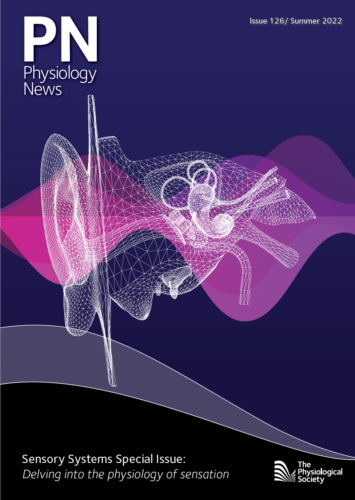
Physiology News Magazine
A “tasty” cough: My unusual sensory symptom of COVID-19 infection
Membership
A “tasty” cough: My unusual sensory symptom of COVID-19 infection
Membership

https://doi.org/10.36866/pn.126.39
Dr Katherine Rogers
Queen’s University Belfast, UK
Dr Katherine Rogers, Queen’s University, Belfast, UK shares the sensory changes she experienced during two bouts of infection with COVID-19.
I caught COVID-19 twice, with the second infection happening exactly two months after the first. During my first infection, I never had any of the three official symptoms at that time, except for slight nasal congestion and a runny nose for a couple of days. My constant refrain during that time was that “I’ve experienced worse colds”. Had it not been for the positive PCR test, I wouldn’t have known I had COVID-19 because I never tested positive by lateral flow test (LFT) during the first infection – was this because my symptoms were extremely mild?
Four weeks after the first infection I developed a nasty cough that was deep and irritating but non-productive. I had no other COVID-19 symptoms but the cough was so bad that I took a PCR test just for reassurance; it was negative. This is significant because it suggests that the positive test I got later by LFT at the end of February was probably not due to a lingering infection from my positive PCR result in December.
A month after the cough started, I tested positive for COVID-19 by LFT; the onset of symptoms happened quite quickly. Over the course of an hour or so, I could feel a change develop in myself. My cough that had been going on for over a month by then quickly worsened. It got more frequent and I felt like I could actually “taste” the cough. It is very difficult to describe the sensory change, as it is nothing that I have ever experienced before with a cough. The “cough taste” was the first noticeable symptom that rang alarm bells for me.
Throughout that night I had a combination of all the symptoms including chills, fever, hot and cold sweats, and a sustained restlessness that disturbed my sleep. The following morning, I was exhausted and by then, I had no appetite whatsoever.
I also noticed that my sense of taste and smell had changed. I didn’t lose either sense but certain types of tastes changed for me. At one point, water had a metallic taste but thankfully that only lasted a couple of days at the height of the infection. By the time I was testing negative, water tasted fine again. Since I had no appetite, all I consumed for four days was Lemsip drinks (an over-the counter lemon-flavoured hot drink containing paracetamol and phenylephrine hydrochloride [a decongestant]) with a spoon of honey. At times, I thought that the sour lemon taste was different.
After four days my appetite began to return but I still found that sour and spicy tastes were less “strong”. Sweet tastes seemed to remain the same throughout; the honey tasted fine and never changed. Within a few days of my appetite returning my sense of taste also returned to normal. The whole experience lasted just over a week.
The tiredness thankfully only lasted for the early days of the infection and I tested negative by LFT on day 5 and 6. Was that because this was a second infection? Interestingly, the cough lingered on. For a couple of weeks after the infection it was still quite debilitating and I required a prescribed salbutamol inhaler (for the first time ever) – just to get relief from the constant harsh cough. Five weeks post infection I still had a slight cough, which has been my only remaining symptom.
I have had two different COVID-19 infection experiences in a relatively short space of time, which is possibly due to the variants I had, but I also wonder about the severity of the symptoms in relation to perhaps waning immunity post-vaccination? Furthermore, was my relatively quick and full recovery from sensory symptoms due to immunisation from vaccination and/or the previous infection?
I have had no antigen tests, nor were my variants confirmed, so a lot of my thinking is circumspect but the sensory changes I experienced during the second infection were unusual and markedly different from anything I have ever noticed with previous colds. Over time, with more research, we will build a clearer picture of the immediate and possibly chronic sensory symptoms associated with infection by SARS-CoV-2 and the COVID-19 illness it causes.
